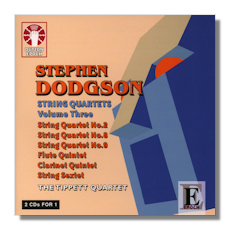
The Internet's Premier Classical Music Source
Related Links
- Dodgson Reviews
- Latest Reviews
- More Reviews
-
By Composer
-
Collections
DVD & Blu-ray
Books
Concert Reviews
Articles/Interviews
Software
Audio
Search Amazon
Recommended Links
Site News
 CD Review
CD Review
Stephen Dodgson

String Quartets, Volume 3
- String Sextet 1
- Quintet for Flute & Strings 2
- Quintet for Clarinet & Strings 3
- String Quartet #2
- String Quartet #8
- String Quartet #9
1,3 Julia O'Riordan, viola
1 Caroline Dale, cello
2 Robert Stallman, flute
3 John Bradbury, clarinet
The Tippett Quartet
Dutton Epoch CDLX7265 2CDs
Stephen Dodgson was born in London in 1924 and has been largely based there throughout his life. A composer, teacher and writer, he was a familiar name in the heyday of the once great BBC Third Programme (now the terminally decaying Radio 3) for which he provided "incidental" music (accompanying drama, for example), talks, features and reviews. Although original, his music was never adventurous. This two-CD set from Dutton played admirably by the Tippett Quartet presents half a dozen of his chamber works, a medium in which he is much at home and which he has explored widely. This is actually the third volume in the series… the other two can be found on CDLX7182 and CDLX7214. The latter adds Craig Ogden's guitar (an instrument for which Dodgson is also well known). The present set (CDLX7265) adds the woodwind of Robert Stallman's flute and John Bradbury's clarinet in addition to Julia O'Riordan's viola and Caroline Dale's cello to the Tippett Quartet (John MIlls, violin; Jeremy Isaac, violin; Maxine Moore, viola; Bozidar Vukotic, cello), which was formed in 1998.
The first thing you're likely to notice about the (extended) Quartet's playings is their flair. Listen to the way they let the tempo of the second Quartet's allegro [CD.2 tr.3] lift and lilt to convey its sense of joie de vivre. The strings are bright, brilliant almost; yet without being at all overwrought or dazzling. The balance between ranges is excellently maintained. And the pace not only of each movement of each of the six pieces here, but also across their developments as a whole, is expertly controlled. The pacing and relationships between fast and slow movements of the Clarinet Quintet for example, suggest a wholeness that the Tippetts and Bradbury bring out with great effect. Dodgson's music is not music of great gesture; nor of small intricate "modular" conception. It's conservative, tonal and vaguely pastoral in the way that some of Alun Hoddinott's music is. There are influences (Walton, the British miniaturists and light music specialists, perhaps; Beethoven even; certainly Britten – listen to that same Quartet's (2nd) third and fourth movements… icy harmonies, ostinati) that make his music accessible. Thus it's essential that the players approach these chamber works in their own right and not as "examples" of anything; not as derivative or imitative.
That's just what the Tippetts do in these appealing recordings. They take the music at face value; they respect its idiom and – without over-squeezing it – they draw out neither the music's profunder, more thoughtful, moments at the expense of its lightheartedness, nor its consequent familiar tone by sacrificing its seriousness. At the same time, all eight musicians responsible for this set play with gusto, sensitivity and a conviction that the music is worth getting to know.
Few listeners would come to the chamber music of Dodgson expecting the depth of Britten, Tippett himself or the other great British quartet, quintet and sextet writers of the last hundred years. But at the same time, musicians who can bring out the most from composers, such as Dodgson, with perhaps more modest aspirations do us all a real service. That's the success of the Tippett Quartet's and additional players' performance here.
Not that Dodgson's work is in any way trivial or under-composed. He knows the repertoire, has respect for its giants (one can detect nods in Bartók's direction, even, at times). Indeed the Eighth Quartet is thematically taut and compact in ways that "lighter" pieces could never be. Although the Ninth (written as recently as 2006) contrasts with the substantial Eighth, more variety could have been provided if the two discs had alternated the quartets with the quintets and sextet, instead of dividing them straight between the two CDs.
To listen to these six works, which actively explore such a fertile corner of the chamber music genre, to hear the intricate and highly effective marriage of strings and woodwind, to appreciate that Dodgson is writing in a style that may be considered "safe" yet which has much technically and in terms of inspiration to recommend it is to need to hear technically striking yet original playing. That's exactly what the Tippett Quartet et al. offer on this acoustically pleasing CD set with its useful background in the short but packed booklet that comes with it.
Copyright © 2011, Mark Sealey.





















